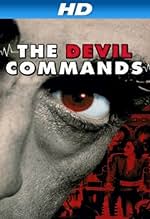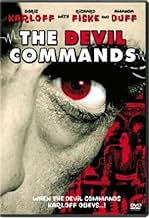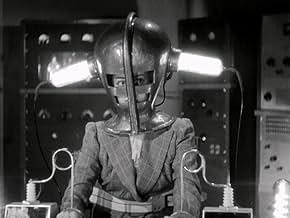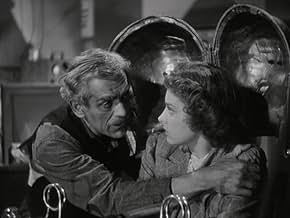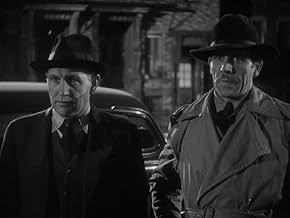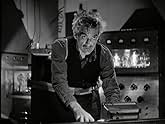IMDb RATING
6.1/10
1.7K
YOUR RATING
Scientist becomes obsessed with the idea of communicating with his dead wife.Scientist becomes obsessed with the idea of communicating with his dead wife.Scientist becomes obsessed with the idea of communicating with his dead wife.
- Director
- Writers
- Stars
Ernie Adams
- Elam
- (uncredited)
Lester Allen
- Dr. Van Den
- (uncredited)
Wheaton Chambers
- Dr. Sanders
- (uncredited)
Earl Crawford
- Johnson
- (uncredited)
Harrison Greene
- Mr. Booth, Bakery Proprietor
- (uncredited)
Erwin Kalser
- Professor Kent
- (uncredited)
Eddie Kane
- Professor Walt
- (uncredited)
George McKay
- Station Agent
- (uncredited)
Al Rhein
- Truck Driver
- (uncredited)
- Director
- Writers
- All cast & crew
- Production, box office & more at IMDbPro
6.11.6K
1
2
3
4
5
6
7
8
9
10
Featured reviews
well-directed nuttiness with one unforgettable scene
As for another viewer, this film was deposited in my memory banks a generation ago. This morning (4 Sept 2007) the TCM screen stirred that memory, so I taped and replayed the conclusion. The content is thin but the film is short, at least for a grown-up. Karloff is splendid, perfectly absorbed as ever in his character. His role is well supported by the evil medium-familiar woman with regulation severely-pulled-back hair. Dmytryk's touch is in evidence already, as every scene is well composed and lighted.
But the reason why the film stuck in my aging memory, and the only reason for it to attract attention, is the stunningly realized seance scenes at the end. As other posters have described, this isn't just any seance: most of the participants have already crossed over, but they look bewitchingly cool sheathed in deco metal suits. (Another poster called them diving suits, but more like space suits you'd find on the covers of Amazing Tales in that era.) In classic seance style, all these suited bodies are seated around a table.
As in Frankenstein and so many other movies since, the action in the lab scene mostly involves turning up the juice, which pours through the whole interlinked seance, adding a lot of hypnotic background noise. (And can be defended historically, since Spiritualists often used electro-magnetic metaphors to describe their rapport.)
What happens then testifies to a lesson later film-makers probably can't re-learn: nothing is more suggestive than restraint. In two concluding scenes where Karloff finally gets the experiment up and running the way he planned, this well-built seance scenario comes to partial but mesmerizing life. A spinning vortex appears at the bodies' center. The voice of Karloff's dead wife breaks through in a grinding electronica: "Julian!"
Then a lovely, unpredictable action: the seance cadavers in their space suits move ever so slightly, bowing toward the vortex in a series of click-actions. Then, when the electricity ceases, they click back into upright postures. Just as the Karloff character hears his wife's voice, something strangely suggestive of life beyond death occurs. The scene lasts only seconds but is repeated for the mob-finale. It's like an Eric Clapton solo, where you're touched less by what is actually played than all that might have been played. The performance stops at its peak moment, launching the audience's imagination in a way that extensions of the scene could never have accomplished.
But the reason why the film stuck in my aging memory, and the only reason for it to attract attention, is the stunningly realized seance scenes at the end. As other posters have described, this isn't just any seance: most of the participants have already crossed over, but they look bewitchingly cool sheathed in deco metal suits. (Another poster called them diving suits, but more like space suits you'd find on the covers of Amazing Tales in that era.) In classic seance style, all these suited bodies are seated around a table.
As in Frankenstein and so many other movies since, the action in the lab scene mostly involves turning up the juice, which pours through the whole interlinked seance, adding a lot of hypnotic background noise. (And can be defended historically, since Spiritualists often used electro-magnetic metaphors to describe their rapport.)
What happens then testifies to a lesson later film-makers probably can't re-learn: nothing is more suggestive than restraint. In two concluding scenes where Karloff finally gets the experiment up and running the way he planned, this well-built seance scenario comes to partial but mesmerizing life. A spinning vortex appears at the bodies' center. The voice of Karloff's dead wife breaks through in a grinding electronica: "Julian!"
Then a lovely, unpredictable action: the seance cadavers in their space suits move ever so slightly, bowing toward the vortex in a series of click-actions. Then, when the electricity ceases, they click back into upright postures. Just as the Karloff character hears his wife's voice, something strangely suggestive of life beyond death occurs. The scene lasts only seconds but is repeated for the mob-finale. It's like an Eric Clapton solo, where you're touched less by what is actually played than all that might have been played. The performance stops at its peak moment, launching the audience's imagination in a way that extensions of the scene could never have accomplished.
Creepy tale has lots of atmosphere but silly plot...
BORIS KARLOFF is a scientist who wants to communicate with the brain waves of his dead wife. His daughter narrates the tale and concludes with: "It is dangerous to communicate with the dead." That's about the impression the viewer gets after seeing what happens in the course of a brisk one hour and six minutes.
Columbia produced this low-budget feature and gave the directing chores to Edward Dmytryk, who would later go on to bigger and better things at RKO. But it's an efficient thriller thanks to his direction and the low-key, shadowy photography that makes the absurd story at least come to life on occasion.
Enjoyable too are the performances of ANN REVERE as a sinister housekeeper who knows all about Karloff's experiments and what goes on behind the locked doors of his laboratory; DOROTHY ADAMS as an inquisitive servant who agrees to check out the lab and gets locked inside; and KENNETH MacDONALD as the Sheriff determined to find out who is responsible for all the missing bodies from the graveyard.
It's typical Karloff stuff and he lends his commanding presence to the role with more dignity than it deserves. If it emerges as a better than average horror vehicle, it's because director Dmytryk is at the helm, but the script is absurd. The low-budget production values are neatly hidden by all the shadowy photography.
Columbia produced this low-budget feature and gave the directing chores to Edward Dmytryk, who would later go on to bigger and better things at RKO. But it's an efficient thriller thanks to his direction and the low-key, shadowy photography that makes the absurd story at least come to life on occasion.
Enjoyable too are the performances of ANN REVERE as a sinister housekeeper who knows all about Karloff's experiments and what goes on behind the locked doors of his laboratory; DOROTHY ADAMS as an inquisitive servant who agrees to check out the lab and gets locked inside; and KENNETH MacDONALD as the Sheriff determined to find out who is responsible for all the missing bodies from the graveyard.
It's typical Karloff stuff and he lends his commanding presence to the role with more dignity than it deserves. If it emerges as a better than average horror vehicle, it's because director Dmytryk is at the helm, but the script is absurd. The low-budget production values are neatly hidden by all the shadowy photography.
Don't open that door!
Corny and cliche'd as The Devil Commands may look to the superficial gaze, it's a powerful expression of the inextinguishable and far from trivial human wish to believe that death is not the end and that the dead we loved are not forever lost to us. Karloff starred in a whole sub-genre of films on this theme from the middle 1930s to the early 1940s (cf The Invisible Ray, Before I Hang, The Man They Could Not Hang, etc), invariably as a misunderstood scientific genius, embittered by tragedy or injustice, whose desire to conquer death clashes fatally with the prerogatives of the Almighty.
Whether one believes in an afterlife or not, it would be a coarsely reductionist mind that could consider the subject ridiculous. What gives these films (and this one in particular) their eerily modernist slant on the matter lies in the way they reflect the public's awe of science in the first half of the twentieth century, when astonishing developments such as radio and television (and that weird form of immortality, the motion picture), made it seem believable that technology might solve the supernatural as well as the physical mysteries. It is worth remembering in this context that the contemporary electrical wizards Thomas Edison and Nikola Tesla, classical Mad Scientists both, attempted to build machines with which to talk to the dead.
In this morbidly obsessive cinematic byway The Devil Commands stands out as one of the most insidiously poignant and nearly blasphemous films of its kind, sailing very close to the emotional and spiritual wind in its depiction of Karloff's bizarre attempts to communicate with his dead wife. As a mad-scientist entertainment it contains some of the most magnificently deranged laboratory scenes ever filmed, surpassed in this context only by James Whale's Frankenstein and Bride Of Frankenstein. I still succumb to its mournful fascination. And if your first viewing doesn't scare you half to death, you can't be more than half alive.
Whether one believes in an afterlife or not, it would be a coarsely reductionist mind that could consider the subject ridiculous. What gives these films (and this one in particular) their eerily modernist slant on the matter lies in the way they reflect the public's awe of science in the first half of the twentieth century, when astonishing developments such as radio and television (and that weird form of immortality, the motion picture), made it seem believable that technology might solve the supernatural as well as the physical mysteries. It is worth remembering in this context that the contemporary electrical wizards Thomas Edison and Nikola Tesla, classical Mad Scientists both, attempted to build machines with which to talk to the dead.
In this morbidly obsessive cinematic byway The Devil Commands stands out as one of the most insidiously poignant and nearly blasphemous films of its kind, sailing very close to the emotional and spiritual wind in its depiction of Karloff's bizarre attempts to communicate with his dead wife. As a mad-scientist entertainment it contains some of the most magnificently deranged laboratory scenes ever filmed, surpassed in this context only by James Whale's Frankenstein and Bride Of Frankenstein. I still succumb to its mournful fascination. And if your first viewing doesn't scare you half to death, you can't be more than half alive.
The Devil Commands (1941) **1/2
One of several "Mad Doctor" films Boris Karloff made for Columbia Pictures in the '40s and often considered one of the best of that group by many fans. It's not bad, but it's only a notch above average in my estimation. Here we have Karloff as a scientist who has discovered a device for reading people's brain waves and then becomes obsessed with the idea of trying to communicate with his recently deceased wife. He enlists the aid of a somewhat eccentric phony mystic (Anne Revere) who becomes the dominant force in the partnership and sets the course for some potentially disastrous events.
This movie was directed by Edward Dmytryk, so at least it enjoys some spirited dashes of mood and dreary lighting, which is one thing that elevates it just over the line of the ordinary. It's interesting to see long-time Three Stooges foil Kenneth MacDonald as a sheriff who suspects that strange goings-on are underfoot in Boris' mysterious house, and Anne Revere's stoic and power-hungry medium is an added benefit. Still, there's something which seems to be lacking here to keep this one from rising above "B" level. Karloff is quite good as the eager but harried scientist, emitting a range of different emotions during the course of the picture. **1/2 out of ****
This movie was directed by Edward Dmytryk, so at least it enjoys some spirited dashes of mood and dreary lighting, which is one thing that elevates it just over the line of the ordinary. It's interesting to see long-time Three Stooges foil Kenneth MacDonald as a sheriff who suspects that strange goings-on are underfoot in Boris' mysterious house, and Anne Revere's stoic and power-hungry medium is an added benefit. Still, there's something which seems to be lacking here to keep this one from rising above "B" level. Karloff is quite good as the eager but harried scientist, emitting a range of different emotions during the course of the picture. **1/2 out of ****
Places We Dare Not Go
Though the science involved in what Boris Karloff is trying to do is very flawed, in The Devil Commands Karloff gives a very good performance as a man obsessed with contacting his late wife. Unfortunately he falls into the clutches of a fake medium played by Anne Revere who takes advantage of him.
The first few minutes of the film show a happy well adjusted Karloff married to Shirley Warde with daughter Amanda Duff also getting ready to marry scientist Richard Fiske. After a car accident where Warde dies in his arms, Karloff goes off the deep end as he becomes obsessed with the idea that Warde is trying to communicate with him via electrical impulses. His efforts to combine science and the occult lead him to Revere and ultimately to tragedy.
The electrical devices in his laboratory have the familiar Frankenstein like look about them, no doubt Edward Dmytryk in one of his early directorial efforts was trying to capture the mood of the Frankenstein films from Universal. Though the rest of the cast is pretty bland, Karloff and Revere play well off each other and carry the film.
One exception to the blandness is that of Dorothy Adams whom I recognized immediately as Bessie the maid from Laura. Her part here is similar to that one and her acting has some real bite to it.
The Devil Commands is from Columbia's B unit and it's not invested with a lot of production values. Still it's a good horror film from the master himself.
The first few minutes of the film show a happy well adjusted Karloff married to Shirley Warde with daughter Amanda Duff also getting ready to marry scientist Richard Fiske. After a car accident where Warde dies in his arms, Karloff goes off the deep end as he becomes obsessed with the idea that Warde is trying to communicate with him via electrical impulses. His efforts to combine science and the occult lead him to Revere and ultimately to tragedy.
The electrical devices in his laboratory have the familiar Frankenstein like look about them, no doubt Edward Dmytryk in one of his early directorial efforts was trying to capture the mood of the Frankenstein films from Universal. Though the rest of the cast is pretty bland, Karloff and Revere play well off each other and carry the film.
One exception to the blandness is that of Dorothy Adams whom I recognized immediately as Bessie the maid from Laura. Her part here is similar to that one and her acting has some real bite to it.
The Devil Commands is from Columbia's B unit and it's not invested with a lot of production values. Still it's a good horror film from the master himself.
Did you know
- TriviaCompleted December 1940, released February 3, 1941.
- GoofsDr. Julian tells Mrs. Walters she had 10,000 volts pass through her body. Volts do not flow or pass, amps do.
- Quotes
Dr. Julian Blair: Anne dear, your mother is not dead, not really. She's come back to me!
- ConnectionsFeatured in Hollywood and the Stars: Monsters We've Known and Loved (1964)
- How long is The Devil Commands?Powered by Alexa
Details
- Release date
- Country of origin
- Language
- Also known as
- Más allá de la tumba
- Production company
- See more company credits at IMDbPro
- Runtime
- 1h 5m(65 min)
- Color
- Aspect ratio
- 1.37 : 1
Contribute to this page
Suggest an edit or add missing content


